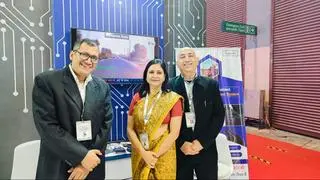What is it that makes entrepreneurs better able to recover from major setbacks? Failure is an inherent part of the entrepreneurial journey and most venture capital models are built around an expectation that only a small proportion of their investments will succeed.
Arun Diaz, interim CEO of IntelleGrow and Advisor to Aavishkaar, grew in stature whilst journeying from a failed start-up to mentoring, investing and supporting other entrepreneurs. Arun was a banker for close to 30 years and was aware of the fact that wealth and success often have failure as part of their foundations. Little did he know that he would be making the transition —from investing his personal wealth in his entrepreneurial dream only to have it go bust — so soon.
Tenacity, the least glamorous life skill and the greatest business asset, came to his aid. As a banker, Arun had learnt a thing or two about determination and endurance. He decided to confront the odds, and let his persistent and optimistic streak lead the way.
Early years
After a degree in mathematics and an MBA, Diaz worked with Standard Chartered Bank for 28 years. “I took early retirement at 50 to come back to India in 2001,” he says.
Teaming up with former colleagues in 2004 was the beginning. Arun started The Apollo Clinic, Thane, as a franchisee of Apollo Health and Lifestyles with Deepa Chandrasekhar, “the wife of a colleague” in 2005-06, and gained valuable insights into the working of the healthcare sector.
Noting that even the standard of behaviour that one would expect from corporate life was lacking in healthcare, “though some professional individuals do exist”, he says professionalism is totally lacking in the sector.
“We thought of it more as an investment, since there were three of us investing. The initial equity was ₹35-40 lakh and subsequently we were to give more loans,” he adds.
Diaz started two healthcare enterprises, Apollo Clinic and Jeevanti Healthcare Pvt Ltd. While Apollo Clinic is still running, Jeevanti Healthcare, which was started in 2011, was shut down in 2014.
Three years down the line, they had to shut shop.
Staring failure in the face, Arun had to make up his mind.
“Healthcare is a difficult area to operate in. There is the whole practice of cuts and kickbacks which is well entrenched in the system,” he says.
The decision was heart-breaking. Arun insists however, he “would not change the amazing experience for anything in the world.” Though as an investment it was not profitable, running the hospital in trying times endowed him with energy, creativity, enthusiasm and a propensity for taking risks.
The experience and unique positioning, at the intersection of social and commercial business, allowed Arun and his team to combine the business training of the commercial world with the passion and commitment of the social world.
“It is the same principle we are now adopting in Vaatsalya,” says Arun.
Aavishkaar’s investment in Vaatsalya, a hospital chain focussed on Tier-II and Tier-III towns, is probably the earliest known impact deal in the healthcare sector.
Vaatsalya provides affordable healthcare services through hospitals and clinics in semi-urban and rural areas, and has six hospitals and more than 800 beds in Karnataka: in Gadag, Hassan, Shimoga, Mysuru, Chikkamagalur and Narasannapeta.
Arun enjoys providing hand-holding and mentoring support to many of the funds’ investee companies. In addition, he takes a keen interest in social entrepreneurship and is more than happy to lend an ear to entrepreneurs specifically tackling the many issues plaguing the healthcare sector.
Pointing out that people do reach out to the organisation mainly for money, Arun says, “In Aavishkaar, our mandate is different from most VC funds. The project does have to have social and rural developmental impact. That is what our investors are looking for.” In Aavishkaar, Arun learnt that social ventures have the ability to scale. “But apart from a social investor, we are also a commercial investor. So, we look at whether a business can scale and be commercial.”
“When a VC fund invests in a start-up, they expect 50-60 per cent returns. Here there is zero return,” he says of his experience at Aavishkaar .
“Some 15-20 per cent of companies might hit the big tag and bring five times returns. It is typical if one invests in a tech start-up, wherein you can make 100 times the return. We cannot expect 100 times multiples, and are delighted with 3x to 5x. We also need to offset losses,” he adds.
New plan
Though each one of us experiences a few ‘stumbles’ in our life, and some of us have the mental scars to show for it, he explains, “sometimes we work hard for the things we truly believe in, only for life to not go according to our plan. These things happen.”
“Personally, I lost ₹1.2 crore on my hospital gamble. As a percentage of savings, it is a huge amount, but what I have gained is even bigger. I am still willing to take risks and now do angel investing in a small way. Mostly, it is in companies that I am mentoring,” Arun adds.








Comments
Comments have to be in English, and in full sentences. They cannot be abusive or personal. Please abide by our community guidelines for posting your comments.
We have migrated to a new commenting platform. If you are already a registered user of TheHindu Businessline and logged in, you may continue to engage with our articles. If you do not have an account please register and login to post comments. Users can access their older comments by logging into their accounts on Vuukle.